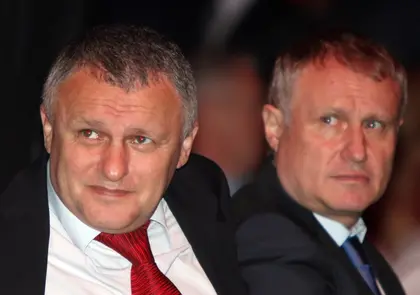The Pechersk District Court has ruled that state-owned PrivatBank must pay about $350 million to British companies owned by the Surkis brothers.
The six companies’ deposits were converted into PrivatBank shares when the bank was nationalized in 2016.
JOIN US ON TELEGRAM
Follow our coverage of the war on the @Kyivpost_official.
Ihor and Hryhoriy Surkis are business associates of the bank’s former owners, Ihor Kolomoisky and Gennadiy Boholyubov. The government decided that they are related parties and bailed in their deposits.
The government took over PrivatBank in 2016 after finding evidence of major fraud, insider lending and a $5.5 billion shortfall in the bank’s balance.
State-owned PrivatBank, the National Bank of Ukraine, the ministries of justice and finance and the prime minister blasted the court’s decision.
“This is one of the biggest transgressions in the history of Ukraine’s judicial system,” Justice Minister Denis Malyuska wrote on Facebook.
Andriy Pozhidayev, the bank’s lawyer, told journalists that PrivatBank is not planning to pay out the $350 million and will appeal.
However, the plaintiffs — the Surkises’ offshore companies — asked for and received a ruling allowing law enforcement to forcibly collect the funds directly from PrivatBank’s accounts if the bank fails to make a transfer itself.
Then, on Sept. 3, two out of six offshore companies — TAMPLEMON INVESTMENTS and LUMIL INVESTMENTS — asked the court and got an approval to withdraw the first portion of the money, $165 million, from the PrivatBank’s accounts, a Ukrainian news publication Novoe Vremya reported.
According to the publication, the other four companies have turned to the court with the same demands.
Since the bail-in, the Surkises and other depositors have filed hundreds of lawsuits trying to get this money back. In total, they are suing for $1.16 billion.
The Pechersk District Court has yet to rule on the merits of the case. Nevertheless, in February, it upheld its 2017 decision that PrivatBank has to pay $259 million to the brothers’ offshore companies.
In April, the Kyiv Court of Appeals rejected PrivatBank’s appeal against this decision.
On Sept. 2, Pechersk District Court issued an enforcement ruling that PrivatBank has to pay $350 million, which includes the original amount plus interest.
The fact that the court ordered this payment before ruling on the merits drew a wave of condemnation.
“Tomorrow we wake up to a new reality,” said Pozhidayev. “When a judge can change the law without the Verkhovna Rada, a judge can change the procedural code.”
The Ministry of Justice must now decide whether the Cabinet of Ministers will execute this decision and how. However, both have come out in favor of PrivatBank.
Malyuska wrote that the court made the decision without considering the facts of the case and ignoring whether PrivatBank was truly liable.
Prime Minister Denys Shmyhal stated that “the government disagrees with the court ruling and will appeal it… we believe that the decision was made in violation of procedural law.”
The Surkises can also try to get the money through the National Bank of Ukraine. But the central bank wrote that it will continue to defend the legality of PrivatBank’s nationalization, the country’s financial stability and taxpayers’ money.
The Pechersk District Court and its judge, Serhiy Vovk, are notorious for controversial decisions.
Malyuska said that the decision further damages Ukrainian courts’ already tattered reputation.
“I am sure that justice in the case will be restored,” he wrote. “But how do you restore confidence in the courts after that?”
You can also highlight the text and press Ctrl + Enter




